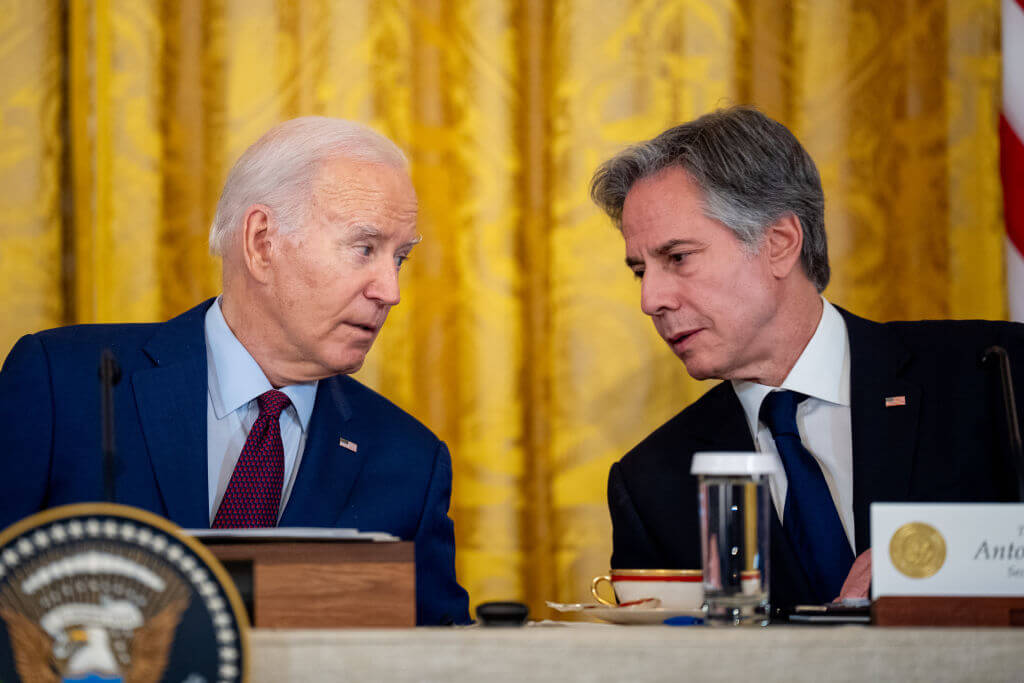Israel Tries To Ease Concern About Fence
WASHINGTON — Responding to American criticism of its West Bank security fence, Israel has given Washington assurances that the fence, which snakes and winds inside the West Bank, is not intended as a border with the future Palestinian state.
Israel also assured the Bush administration that it will give due consideration to Palestinian humanitarian concerns as it charts the course of the fence.
Israeli diplomats in Washington said the assurances were given in response to American “queries.” While the assurances may not fully allay the administration’s concerns, Jerusalem hopes they will “contain” the budding conflict over the fence so that the two allies can “at least agree to disagree,” a Washington lobbyist for Israel said.
However, American pressure on Israel to offer concessions to the Palestinians has grown rather than lessened in recent days. The American pressure appears to have come partly in response to the embattled position of the Palestinian prime minister, Mahmoud Abbas, also known as Abu Mazen, who threatened to resign this week after coming under attack within the central committee of his Fatah movement.
In addition to their criticism of the fence, American officials this week criticized Israel for the slow pace of removal of so-called illegal outposts in the West Bank. Both in the “road map” and in the agreements reached in last month’s summit in Aqaba, Jordan, Israel committed itself to act swiftly to remove some 90 outposts established since Sharon took office. However, American officials told Israeli leaders in meetings this week that only 10 outposts had been dismantled and nine new ones had gone up, for a net reduction of only one, according to the daily Ha’aretz. The outposts were the subject of meetings in Jerusalem between American special envoy John Wolf and Israel’s foreign and defense ministers, Silvan Shalom and Shaul Mofaz.
The fence project came under sharp criticism over the past month from a series of ranking administration officials, including National Security Adviser Condoleezza Rice. American officials have argued that the positioning of the fence could prejudge the “final status” issue of where the border between Israel and the future Palestinian state will run. They have also cited Palestinian concerns that the fence will impose humanitarian suffering on Palestinians by cutting thousands off from the West Bank and even from their own agricultural fields. Rice flatly told the Israeli Cabinet during a visit last month that Israel should reconsider the fence.
Despite efforts by Israeli officials to minimize the extent of the disagreement, both sides appear to be digging in their heels. Rice repeated the administration’s concerns about the fence last week in a White House meeting with a group of Jewish organizational leaders, and administration officials were later quoted as insisting Washington would “not back off.”
Israel, for its part, has stated flatly that it will not drop the fence project. “We told them that this is not a political fence but a security fence, and that Israel has no intentions of using it to establish facts on the ground,” an Israeli diplomat told the Forward. “This is reversible. We reminded the Americans that when we pulled back from Sinai — following the Israel-Egypt peace accord of 1978 — we removed much more than a fence.”
American concerns were prompted in part by complaints from Palestinian leaders, including the prime minister, Abu Mazen, during Rice’s visit to the region last month. Both American and Palestinian critics of the fence have argued that the fence would not be a major point of contention if it followed the 1967 border between Israel and the West Bank. However, the planned route has been extended several times in the past year under pressure from the settler lobby to include larger swaths of the West Bank on the Israeli side. One of the most hotly contested modifications is a salient that reaches deep into the West Bank, just north of Jerusalem, to incorporate the urban settlement of Ariel. Israeli officials have hinted in recent days that they might consider modifying sections of the route in deference to criticisms.
Supporters of the settlement movement have stepped up their pressures as well. This week Israel’s minister of transportation, Avigdor Lieberman, head of the far-right National Union party, ordered Israel’s national railroad to begin plans for a new rail line that would stretch 18 miles from Tel Aviv to Ariel, according to a report in the daily Yediot Aharonot. The mayor of Ariel, Ron Nachman, told Yediot that the new rail line would be a “peace bridge” that could allow Palestinians from Nablus and Ramallah to reach Gaza easily by train via Tel Aviv. Labor Party leaders condemned the planned rail line as a misdirection of transportation funds that should be used to ease traffic patterns in the Tel Aviv metropolitan region.
While administration officials are making clear that they intend to push Israel on issues such as the fence, settlements and humanitarian confidence-building measures, they are also making it clear to the Palestinians that Washington expects Abu Mazen and his security aides to disarm the militant Palestinian organizations and dismantle their military infrastructure.
Administration officials told Israeli diplomats recently that they believe dismantling the military operations of organizations such as Hamas is unavoidable and that the moment when Abu Mazen’s Palestinian Authority will have forcefully confronted Hamas will be a “moment of truth” for the peace process.
Dennis Ross, who was the Middle East peace-process coordinator under the Clinton administration, last week said that he could not see how the P.A. could disarm Hamas and dismantle its infrastructure without force. Ross, who is now the director of the Washington Institute for Near East Policy, a pro-Israel think tank, pointed out that although the P.A. needs time to gain strength to confront Hamas, it may also, paradoxically, be more difficult for it to confront Hamas the longer the Palestinian cease-fire lasts. “Let’s say we have several months of calm; there would be enormous pressure within the Palestinian society not to rock the boat. Why go and create a problem with Hamas if they are not carrying out any attacks?” Ross said. Palestinians would ask, “But if you are not prepared to take apart the terrorists’ infrastructure, then you’re not going to see the Israelis take the political steps that are required of them,” he added.
Therefore, “the crux of the matter is: Is the cease-fire going to be used to buy time to build the authority and the credibility of this Palestinian government and will they then take on those who have built up an infrastructure that can be used to frustrate any hope for peace down the road?” Ross asked.

I hope you appreciated this article. Before you go, I’d like to ask you to please support the Forward’s award-winning journalism this Passover.
In this age of misinformation, our work is needed like never before. We report on the news that matters most to American Jews, driven by truth, not ideology.
At a time when newsrooms are closing or cutting back, the Forward has removed its paywall. That means for the first time in our 126-year history, Forward journalism is free to everyone, everywhere. With an ongoing war, rising antisemitism, and a flood of disinformation that may affect the upcoming election, we believe that free and open access to Jewish journalism is imperative.
Readers like you make it all possible. Right now, we’re in the middle of our Passover Pledge Drive and we need 500 people to step up and make a gift to sustain our trustworthy, independent journalism.
Make a gift of any size and become a Forward member today. You’ll support our mission to tell the American Jewish story fully and fairly.
— Rachel Fishman Feddersen, Publisher and CEO
Join our mission to tell the Jewish story fully and fairly.
Our Goal: 500 gifts during our Passover Pledge Drive!
























